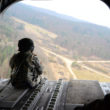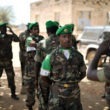Torture at Guantánamo?
“On a couple of occassions [sic], I entered interview rooms to find a detainee chained hand and foot in a fetal position to the floor, with no chair, food, or water. Most times they had urinated or defacated [sic] on themselves, and had been left there for 18-24 hours or more. On one occassion [sic], the air conditioning had been turned down so far and the temperature was so cold in the room, that the barefooted detainee was shaking with cold…. On another occassion [sic], the A/C had been turned off making the temperature in the unventilated room probably well over 100 degrees. The detainee was almost unconcious [sic] on the floor, with a pile of hair beside him. He had apparently been literally pulling his hair out throughout the night.”—Judge Joyce Hens Green, January 31, 2005,
in an opinion quoting an FBI agent’s notes
My name is Murat Kurnaz. I am twenty-seven years old. I was born and raised in Germany. Recently, I got married to a kind young woman from a good family, which makes me happy. We rented a nice flat in the Turkish section of my hometown of Bremen, Germany. My life now appears to be hopeful, even normal. But before all of this, from the age of nineteen to twenty-four, I spent five years of my life as a prisoner (or, I often think, as a victim) in American torture camps in Kandahar and Guantánamo Bay.
How did this happen to someone like me, from an honest, hardworking family? Have you ever read stories or seen movies where someone is in the wrong place at the wrong time and his life turns into a nightmare?
I was traveling with a peaceful missionary group, which I had joined to learn to read the Koran and to pray. My family is Muslim, but they did not pray. I wanted to learn these important Muslim rituals because I had just married a devout woman in Turkey (who later divorced me while I was in Guantánamo). Besides, I was young and wanted to travel and see some other part of the world. I left my home in Bremen in the fall of 2001, but before war had broken out in Afghanistan. I didn’t know it at the time, but this decision turned out to be a colossal mistake.
EXTRAORDINARY RENDITION—Toward the end of my travels in Pakistan, I was on a civilian bus, full of regular Pakistani men and women, headed for the airport to return home to Bremen. At a routine checkpoint, a Pakistani guard pulled me off the bus to ask me questions—he may have thought I was suspicious because of my Western appearance. Next thing I knew, I was in Pakistani detention for weeks; I was interrogated repeatedly, and told them over and over my story. It didn’t matter; they held me hostage and eventually turned me over to the Americans. I remember very well the first question American interrogators asked me: “Have you seen Osama bin Laden?” I answered “Yes”—like everyone else, I had seen him on TV and in the newspapers. But I live in Germany. Of course I’ve never seen him in the flesh.
The Americans shackled and hooded me (the first of hundreds of times this was done to me) and flew me to the American base in Kandahar, Afghanistan. I later learned from my American interrogator that they paid the Pakistani police a bounty of only $3,000 for me. This was a cheap price. I know many detainees who were sold to the Americans for bounties. The Americans dropped flyers all over Afghanistan offering lots of money for this. I heard recently that the [former] president of Pakistan wrote a book bragging that he had received almost $300 million from Americans to turn over suspects.
KANDAHAR —In the American prison camp in Kandahar I was shocked by the awful treatment we received. All my life, I had a very good impression of Americans, so I couldn’t believe Americans would do these kinds of things. It was winter and freezing cold and I just had overalls and no blankets or coat. We slept outside, behind barbed wire fences. Soldiers watched me and the other prisoners with machine guns, and threatened to kill us. They called me “terrorist.” They punched and kicked me. The food I received seemed barely enough to keep me alive. When we needed to go to the bathroom, they gave us buckets. After my first interrogation in Afghanistan, they asked me if I was with Al Qaeda or the Taliban. When I insisted I was not, they got angry. They also tried to get me to sign a piece of paper admitting I was a member of Al Qaeda. I refused. The abuse got worse. Once, a guard dunked my head in a large bucket of water and punched me in the stomach so I would be forced to inhale. One guy used electroshocks on my feet, and joked that it would keep me warm. At one point, I was chained and hung by my wrists for a long time. A doctor sometimes checked if I was okay. Then I would be hung up again in the same position.
The interrogators also accused me of being affiliated with Mohamed Atta. They thought that because we are both from Germany and both Muslims, I must have worked with him. This was ridiculous, and without any basis in reality. But I believe the hanging was punishment for not admitting to this, coercion to try to force me to admit it. The pain from this treatment was beyond belief. I know that others died from this kind of treatment.
GUANTÁNAMO—From Kandahar, I was transferred to Guantánamo in 2002. In Guantánamo, the conditions and the treatment were barely fit for animals, and certainly not for human beings. I was deprived of sleep and food for long intervals. The guards called the sleep deprival “Operation Sandman.” I was forced to be in solitary confinement for long periods of time for no reason and subjected to extreme cold and heat. I was subjected to religious and sexual humiliation. I was beaten multiple times. The guards forced me to accept medication that I did not want. I was interrogated over and over again, but always with the same questions. I told my story over and over, my name over and over, and details about my family over and over. I quickly got the impression that the interrogations were pointless and not really interested in the truth.
The first time I saw my American lawyer was in October 2004. At first, I did not believe he was a lawyer. There was no law in Guantánamo and the interrogators always lied to us, so I didn’t know what was the truth. But this man brought a handwritten Turkish note from my mother, and so I came to trust him. He told me there was a legal case that my family brought to get me released. I had no idea about this. From 2002 until my lawyer’s visit in 2004 in Guantánamo, I had no idea anyone even knew the camp existed or even that I was alive. After that, I received many postcards from Americans supporting me, and I know there were many other people in America and Germany working to help me get out. I want to thank them for their help.
CRIME AND PUNISHMENT—I always knew I had done nothing wrong. But it has now been proven not only that I’m innocent but that both the U.S. government and the German government knew it all along. In fact, they had discussed my innocence as early as the fall of 2002. The U.S. government asked the Germans if they would take me back, and the Germans said no. They left me to rot in this horrible place for an additional three years. I think that I was eventually released because of the work of my lawyers in the U.S. and in Germany, who proved to the German public that I was innocent and to pressure the new German government to negotiate for my release. If there had been any law in Guantánamo, I would have been released much earlier. Instead, the U.S. just called me an enemy combatant and said I had no rights. I believe my story, with some variations, is true for many others still in Guantánamo.
Since my release, I have written a book about what happened [now available in English as Five Years of My Life: An Innocent Man in Guantánamo; Palgrave Macmillan]. I have spoken about my ordeal with many people in different countries—Germany, Belgium, France, U.K., Ireland, Sweden. My impression is that they all were deeply disappointed that this is being done by Americans and angry at America for not living up to its own standards. They all supported the U.S. after 9/11, but now they criticized the U.S. for its hypocrisy and for ignoring the law.
I hope the new American president, Barack Obama, sticks to his promise to close Guantánamo, because I worry about some of the other detainees who are in their seventh year there. No human being can endure this treatment and isolation. I know that what was done to me cannot be undone. But will anyone be punished in the U.S. for what was done to me and others?
I might expect a system like Guantánamo to be developed by a poor, tyrannical, or ignorant country. I never would have imagined it would be created by the United States of America. In Germany, we believe that leaders who commit illegal acts must be punished. Is this not what happens in a democracy?
Two Narratives: Detention and Torture
Murat Kurnaz was one of the more fortunate Guantánamo detainees—if such a category makes sense. His good fortune was that the Center for Constitutional Rights took up his case and Seton Hall Law School professor Baher Azmy signed up to represent him. In 2004, in collaboration with German attorney Bernhard Docke, Azmy began the process of challenging Kurnaz’s detention.
When their efforts were blocked by the Bush Justice Department’s appeal of U.S. District Judge Joyce Hens Green’s opinion granting habeas rights to Kurnaz and other Guantánamo detainees, the attorneys and the Center for Constitutional Rights took Kurnaz’s case to the court of public opinion in the United States. And in Germany, where Kurnaz was born of Turkish immigrant parents. German law does not convey citizenship by birth, but Kurnaz spent his entire life in the country and was a Western European. The public-relations campaign paid off. Documentation that German and American intelligence agencies years earlier had determined that Kurnaz was innocent compelled Chancellor Angela Merkel to take up the case with President Bush when she visited the White House in January 2006. In August of 2006 Murat Kurnaz was flown home to Germany.
THE BANALITY OF TORTURE—When I interviewed Kurnaz in his lawyer’s office in Bremen two years ago (for a chapter in Bill of Wrongs, which I wrote in collaboration with the late Molly Ivins), I was taken by his unemotional, straight-ahead account of five years of incarceration in the harshest of circumstances—for something he had not done. He knew the material. He had lived the story and, working with German journalist Helmut Kuhn, had already written a book about his American experience.
At the time, it occurred to me that there were two narratives. One involved illegal detention. The other involved torture. It was clear to me that Murat Kurnaz was tortured at Kandahar. And at Guantánamo—even if what he was subjected to there might be considered “torture light,” a term of art that University of Virginia Law School professor Robert Turner introduced in Congressional testimony. Many of the techniques Kurnaz described to me two years ago are spelled out in the “torture memos” that President Obama ordered released in April.
After the interview in Bremen, Bernhard Docke told me that as civilized people we “don’t torture innocent people.” He paused and added, “We don’t torture guilty people.”
Murat’s terse dispatch is yet another reminder that under the color of our flag and using our tax dollars agents of our government did engage in torture. It also raises questions about the torture timeline. He was arrested in December 2001 and shortly thereafter was subjected to torture by American agents. And in a process that recalls the Nazis’ medicalization of torture, he was routinely examined by an American medical professional, to determine how he was holding up. The machinery of torture was fully operational long before memoranda written by attorneys at George W. Bush’s Office of Legal Counsel declared it “legal.”
The larger torture narrative is now beyond the control of the president and the Congress. As Senator Sheldon Whitehouse (D-RI) has said, a full accounting by a truth commission will ultimately become inevitable. That full accounting will require interviewing the victims as well as the intellectual authors and perpetrators of torture.
FORMER FBI AGENT SPEAKS OUT—Ali Soufan has infiltrated Al Qaeda and worked on the first U.S. interrogation team questioning bin Laden lieutenant Abu Zubaydah, after he was captured in a firefight in Pakistan in 2002. Soufan also extracted actionable intelligence from an Al Qaeda operative known as Abu Jandal, and was a witness in the only two trials conducted at the U.S. prison camp at Guantánamo. He had been an FBI agent with a hot CV.
Soufan was equally effective in dismantling some of the foundational deceits that Congressional Republicans and former Vice President Dick Cheney are using to defend the Bush administration’s use of torture. Soufan is an old-fashioned by-the-book agent to whom torture is anathema. At a May 13Judiciary subcommittee hearing, Senator Whitehouse walked him through a series of questions regarding the official account of the interrogation of Abu Zubaydah.
Soufan’s testimony, delivered from behind a red panel to protect his identity, was devastating. Under oath, Soufan testified that during the first round of questioning, when no “enhanced interrogation methods” were used, Zubaydah gave up Khalid Sheikh Mohammed as the mastermind of the 9-11 terrorist attacks—information vital to U.S. intelligence. That initial interrogation was interrupted by a second team, led by private contractors who began to use harsh techniques, causing Zubaydah to shut down.
Soufan’s team was called back in and used “Army Field Manual techniques” to persuade Zubaydah to provide the name of José Padilla, the so-called “dirty bomber.” The second team again returned, resumed harsh tactics, and Zubaydah again shut down. As the private contractors ratcheted up the heat, they turned to what Soufan described as “borderline torture.” He called his superiors and said he would either have to make an arrest or leave.
He left. In fact, FBI director Robert Mueller sent word from Washington that Soufan and his team were off the case. Zubaydah was later waterboarded eighty-three times.
Whitehouse read from one of the “torture memos” issued by the Bush administration’s Office of Legal Counsel (OLC), and released by the Obama administration in mid-April. “Interrogations of Zubaydah, again once enhanced techniques were employed, furnished detailed information regarding Al Qaeda’s organizational structure, key operatives, and modus operandi—and identified KSM as the mastermind of the September 11 attacks.”
When Whitehouse asked Soufan if he knew that the statement was untrue, Soufan said “Yes, sir.” Zubaydah had, in fact, provided the information before any enhanced techniques were used. Whitehouse’s questioning continued, with Soufan’s responses revealing additional misrepresentations in the OLC opinion, which was carefully crafted to justify further torture. Confronted by similar claims that President Bush made in 2006 regarding Zubaydah’s interrogation, the FBI agent discreetly said the former president “probably was told half-truth.” In fact, the president lied. All presidents lie. Few make deceit programmatic. The search for the truth about torture is only going to get uglier.






0 Comments